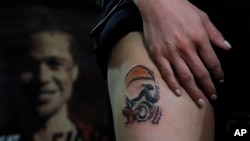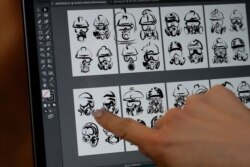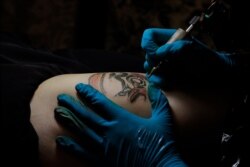Mike Chan's tattoo needle buzzes gently as he draws a design on his customer's thigh — a figure wearing a helmet, goggles and mask.
Dipping his needle into pots of black, red and yellow ink, Chan hunches over his client's leg as he painstakingly brings to life the image of a Hong Kong protester clad in protective gear.
Using his art is Chan's way of contributing to Hong Kong's anti-government protest movement, which has consumed the semi-autonomous Chinese territory for months.
While groups of hardcore protesters tangling with riot police have become the movement's most visible symbol, others are using skin and ink to show their support.
"I am actually just a peaceful protester. I really want to go to the front line, but I don't have the courage yet to stand and fight against the government at the front because I'm very frightened," said Mary, who was getting the thigh tattoo, her first.
She chose her thigh because she could easily cover it up. She would reveal only her first name because she didn't want anyone she works with to find out.
Many protesters have sought to conceal their identities with face masks to avoid being identified, out of fear of arrest.
Hong Kong's protest movement erupted in June in opposition to an extradition bill that would have sent suspects to stand trial in mainland China, and later expanded to include full democracy and police accountability.
Rallies have frequently ended in mayhem, with hardcore protesters wearing goggles and gas masks throwing bricks and firebombs at police armed with tear gas, pepper spray and water cannons.
Now in its fifth month, the unrest has polarized the city.
Mary, 29, said she has taken part in mass protests that involved peaceful activity, such as singing along to the movement's anthem.
But she added, "I really admire front-line protesters who fight at the front and are not afraid of getting arrested or being beaten up. Not everyone has this courage."
Mary said she had been thinking about getting a protest tattoo for about two months. She hoped that it would inspire her friends to get them too.
Chan, who has been working as a tattoo artist for two years, said demand took off after he started doing the protest tattoos for free in July, though it has tapered off more recently.
"I do these resistance tattoos free of charge because I see this as part of protesting," said Chan, comparing himself to supporters handing out free water bottles during rallies in Hong Kong's sweltering heat.
He offers a few dozen variations of the mask and goggles figure for free and has done about 70 of them.
"I want to give them a choice, not just like a stamp that's all the same," he said.
He charges for other protest-themed tattoos such as slogans like "Free Hong Kong" and "Fight for freedom" done in calligraphy, because they take more time.
Tattoos in Hong Kong used to have unsavory connotations, usually signifying that the bearer was a member of an organized crime gang. But Chan and Mary say those attitudes have changed in recent years and their acceptance as an art form has grown.
After about half an hour, Chan is finished and Mary shows off her thigh, now decorated with a stylized figure of a protester wearing a yellow helmet, goggles and respirator mask with pink filters.
Even though it's permanent, Mary said she'd never regret it.
"Because of what has happened over the past few months, you actually can't speak out much or do anything much," she said. "This is the only thing that you can do to remember this for the rest of your life."






